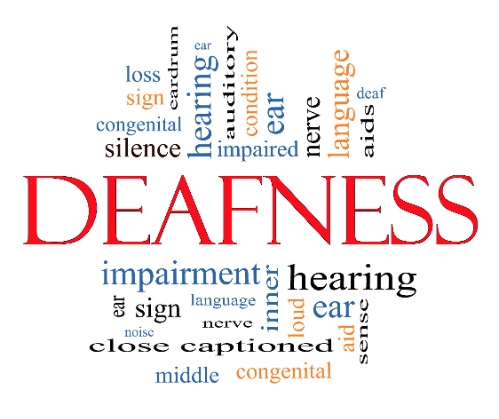I am sure you are aware of hearing impairment …
Deafness means loss of hearing and it may be partial or total. Hearing impairment cannot be seen and hence its effects are not visible to others, so deaf suffers in silence. Unlike blindness, deafness often provokes ridicules rather than sympathy. A deaf person is so isolated from family and friends and greeted by unsympathetic attitude he/she is often depressed and needs psychological counselling.
The consequences for a child born with hearing loss are quite severe. It is well established that a child with hearing loss cannot develop speech and language abilities. This puts the child at a disadvantage in school, higher education, and limits future professional opportunities. The problem of the child deaf from the birth is quite different from that of the adult who has become completely deafened after school age or in adult life. The hard of hearing person whose deafness has developed slowly over the years is different again. But, for all of them, the handicap is the same – the handicap of the silent world, the difficulties of communicating with the hearing and speaking world.
Hearing Impairment – India
In India, 63 million people (6.3%) suffer from significant auditory loss. Four in every 1000 children suffer from severe to profound hearing loss. With over 100,000 babies that are born with hearing deficiency every year. The estimated prevalence of adult-onset deafness in India was found to be 7.6% and childhood onset deafness to be 2%.
Causes of Hearing Impairment –
The causes of hearing loss and deafness can be either congenital or acquired –
Congenital causes leading to hearing loss include:
- Infections like maternal rubella, syphilis or certain other infections during pregnancy;
- Low birth weight
- Birth asphyxia (lack of oxygen at the time of birth);
- Inappropriate use of ototoxic drugs (such as aminoglycosides, cytotoxic drugs, antimalarial drugs and diuretics) during pregnancy
- Severe jaundice in the neonatal period, can damage nerve for hearing in a newborn infant, leading to defness.
Acquired causes lead to hearing loss at any age.
- Infectious diseases such as meningitis, measles and mumps can lead to loss of hearing especially in childhood but can also occur in later life.
- Chronic ear infection, which commonly presents as discharging ears, can lead to hearing loss. In certain cases this condition can also lead to serious, life-threatening complications, such as brain abscess or meningitis.
- Collection of fluid in the ear (otitis media with effusion) can cause hearing loss.
- Use of ototoxic drugs at any age, such as antibiotic like Gentamicin or antimalarial medicines, can damage inner ear.
- Head injury or injury to the ear can cause hearing loss.
- Working in excessive noise or loud music or other loud noises, such as gunfire or explosions, can affect hearing.
- Age-related hearing loss (presbyacusis) is caused by degeneration of sensory cells.
- Wax or foreign bodies blocking the ear canal can cause hearing loss at any age
Early Detection – Need of the Hour
60% of hearing loss is due to preventable causes, once acquired treatment depend on the type of hearing loss, can be medical, surgical or wearing a hearing aid.
Weather you’ve noticed it yourself and family or friends are making comments about your hearing, it is extremely important not to delay having your hearing checked. Professional advice from a Otolaryngologist also popularly known as ENT doctor is what you need. Depending on the cause in team with the audiologist your ENT doctor after thorough history, examination and evaluation would give you specific treatment.
Integrated Approach
Internal and external stigma about hearing loss leads to denial of the condition which can delay in seeking treatment leading to mal adaptive behaviours like avoiding social interactions, not choosing to use assertive communication strategies, social withdrawal, depression, anxiety, memory problems.
Coping strategies include recognize and accept the hearing loss, understand the deleterious side effects of stigma and self-stigma, group interventional programs, interacting with people who overcame self-stigma, overcoming the shame and poor self-esteem.
It’s not the Deaf but entire Society
It is not deaf who need more awareness it is who support them emotionally, socially, financially. Family education and informational counselling on the targeted health condition is what should be taken seriously and it is our crucial responsibility to address underlying mental health issues.
Considering the enormous impact of deafness on the social, economic, and productive life in India due to its burden and also gaps in human resources to meet this health challenge, primary healthcare must be the strategy of choice for the provision and implementation of prevention of deafness and hearing loss in India.
Stigma of Wearing Hearing Aid
If you think wearing a hearing aid is noticeable what about asking others to repeat everything they say, isn’t it more noticeable and annoying? Often unknowingly our behaviour is driven by societal expectations and where hearing loss is considered a disability of aged one should considerably weigh the negative impacts of the underlying condition.
With hearing loss one may appear disinterested in the conversations, Social isolation is obvious danger as people begin to withdraw from activities that would put them in touch with people and that can lead to loneliness and depression.
Our well being is our wealth that no one can steal, agree? Yes. Social, emotional, economic and functional well-being is what counts to you and me. With timely treatment and proper support any one with hearing loss can lead absolutely normal life.
—————————————————————————————————————————————————-

Article prepared by Dr Samyuktha Samavedam, ENT, Head and Neck Surgeon, Apollo Spectra Hospitals, Kondapur, Hyderabad







Comment here